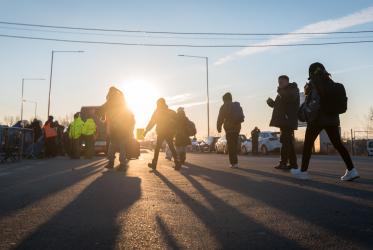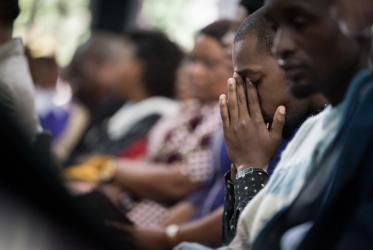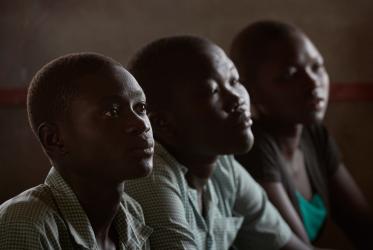Adopted by the Central Committee, Potsdam, Germany, 28 January - 6 February 2001.
Background. The conflict in Sudan has been on the ecumenical agenda for over three decades. The roots of the conflict lie in its history of slavery and colonialism and date back to 1956 when the country gained independence from Great Britain. The situation today, however, has become increasingly more complex than when the almost thirty-year long conflict began. The main causes of the conflict are to be found in:
- The divide-and-rule policy of the colonial rulers, manifested in the "Closed District Act" of 1935 that barred freedom of movement between the Northern and Southern provinces of Sudan;
- Unequal development policies between the North and the South that gave rise to present disparities;
- Religious rivalry, enforcement of cultural hegemony, tribalism and racism;
- Failure of the Government of Sudan to implement the spirit of the 1972 Addis Ababa Peace Accord that gave rise to the present environment of total lack of faith and trust amongst the Southerners against the Government in the North;
- The reluctance on the part of the Government of Sudan to abide by the Declaration of Principles (DOP) agreed to between the parties in the framework of mediation by IGAD (the East African Intergovernmental Agency for Development); and
- The refusal by the Government of Sudan to accept separation of religion and state in the Constitution.
From 1971 the WCC, in cooperation with the AACC, engaged actively in a mediation effort with the South Sudan Liberation Movement and the Government of Sudan that led to the 1972 Addis Ababa peace agreement. Though this agreement brought a cessation of hostilities and a substantial reform of government of a united Sudan, it eventually collapsed, giving rise to a new civil war.
In view of the new intensification of the fighting, the WCC Central Committee adopted a Minute on the Sudan in August 1992, expressing concern about the situations in South, East and West Sudan that had displaced thousands of civilians, especially including children. It called on the United Nations to promote a cease-fire in Southern Sudan and a disengagement of troops, together with resumption of the stalemated Abuja negotiations. The Central Committee reaffirmed the need for the WCC to remain in contact with the parties to the conflict in efforts to promote a just and lasting peace.
Again in September 1997 the Central Committee adopted a Statement on Sudan, where it welcomed the common position taken by the church leaders in North and South Sudan in their paper: "Here We Stand United in Action for Peace." That paper called for a stop to the war and dialogue for peace among the armed factions in the South and between them and the Government of Sudan. The Central Committee urged all parties, their supporters abroad and those seeking to assist in the achievement of a negotiated peace to support the resumption of the IGAD Peace process, to cooperate with it, and to place their various initiatives within the framework of the IGAD principles.
The Sudanese churches have been unceasing in their own efforts to promote peace at all levels. The New Sudan Council of Churches has undertaken a significant, innovative new effort in this direction through a series of People-to-People Peace Conferences in Southern Sudan. These have resolved a series of ethnic and communal conflicts and brought hope and stability to some of the areas most affected by the hostilities. The Khartoum-based Sudan Council of Churches has also developed an active programme in advocacy and grassroots peacemaking, especially among women and youth.
At the regional level, the IGAD Peace Process -- that started with much promise and hope with the acceptance of the Declaration of Principles by the parties to the conflict -- now shows signs of stagnation despite zealous efforts of the IGAD Secretariat as well as of Northern States members of the IGAD Partners Forum to keep the negotiations on track. These have not been sufficient to remove the primary obstacle in the way of negotiations, namely the reluctance on the part of the Government of Sudan to accept the principles of separation of religion and state and to implement fully the IGAD Declaration of Principles. As a result, impatience with the slow progress of negotiations has led to insistent new calls by the people of the South, and of their churches, for self-determination and independence from the North.
The current situation. In the late 1990s the Government's oil exploration efforts in Southern Sudan, in cooperation with Western and Asian petroleum companies, succeeded in producing some 150.000 barrels a day in the Upper Nile. Oil production has contributed to an escalation of the conflict and hardened the determination of the Government of Sudan to pursue a military solution to the conflict. The churches in Sudan, together with ecumenical partners abroad, have called for a just sharing of oil resources and have demanded that the oil revenue be spent on improving the situation of the people and not on promotion of the war effort through purchase with oil revenues of more sophisticated arms.
In its war effort the Government of Sudan has used air power ever since the war began in Southern Sudan. In recent times, however, aerial bombardment has targeted civilians and taken an increasingly heavy toll through high altitude bombing. Densely populated civilian areas like Kotobi and Lui have been bombed repeatedly, resulting in loss of life and destruction of property. One of these bombings that occurred in the hometown of Bishop Paride shortly after he addressed the Eighth WCC Assembly in Harare was vigorously protested immediately by the WCC Officers to the Government of Sudan through its embassy in Zimbabwe.
The continuing bombing has further increased the suffering of the people already caught in the midst of this seemingly endless conflict. Bombing missions have not spared NGOs involved in humanitarian relief operations, a number of whose aircraft have been destroyed. These air strikes eventually drew international attention. They were suspended for a period in the middle of last year after UN General Secretary Kofi Annan intervened, but were resumed with a vengeance later. On 29 December 2000 the Sudan air force bombed the Episcopal Church Cathedral in Lui, Equatoria Province, completely destroying it. The raids continue unabated taking a continuing heavy toll of casualties.
The Central Committee of the World Council of Churches meeting in Potsdam from 29 January to 6 February 2001, profoundly conscious of the unbearable suffering of the Sudanese peoples, especially those in the South, as a result of more than thirty years of civil war:
calls on the Government of Sudan to cease immediately the bombing of civilian targets of Southern Sudan, Nuba Mountains, Southern Blue Nile and other marginalized areas, and to abide by international law;
calls for the establishment of a no-fly zone in these areas, except for protected access of aircraft transporting humanitarian supplies;
urges the Government of Sudan, the SPLA and other warring parties to abide by the Geneva Convention and to allow independent observers to monitor the situation.
reminds the Government of Sudan of its responsibility to guarantee the safety and security of all its citizens both in the North and in the South;
notes with concern that the oil revenue earned by the Government of Sudan is diverted to its war effort and contributes to the escalation of fighting in Southern Sudan rather than being utilized to meet the urgent needs of the people affected by the hostilities;
requests member churches to undertake lobbying and advocacy efforts with governments and oil companies based in their countries for the cessation of further petroleum exploration and development in Southern Sudan until such time as a peace agreement is reached between the parties;
reiterates its conviction that any lasting peace in Sudan must be negotiated with the support of partner states in the region through the IGAD peace process and the Declaration of Principles enunciated thereunder;
reassures the churches of the Sudan of the continuing support and prayers of the World Council of Churches in their peace efforts;
appeals to WCC Member Churches to intensify their efforts to encourage and support the joint peace initiative of the Sudan Council of Churches and the New Sudan Council of Churches; and
urges churches and church-related agencies to continue to provide necessary humanitarian support to the Sudan for the needs of refugees and displaced persons, those in desperate situations of poverty, and the victims of war, including especially those disabled as a result of wounds inflicted through war, mines and bombing.



